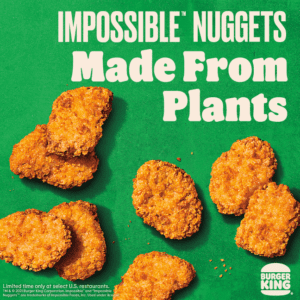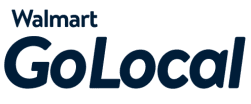 A few week ago, I wrote an article about the transformative nature of the plant-based meat supply chain. Over the last few years, Beyond Meat and Impossible Foods have been creating meat substitutes that promise to eat “more like meat.” Fast food chains around the country have been introducing meatless burgers, and now Burger King is offering a first: meatless chicken nuggets. Earlier this week, the company announced that as chicken meat becomes more expensive and harder to find, it will once again partner with Impossible Foods to pilot meatless nuggets in several markets, making it the first fast-food chain to offer the company’s new chicken alternative. According to Bank of America Securities, chicken commodity prices have doubled this year. In fact, Yum Brands’ KFC stopped advertising its chicken tenders due a supply shortage last month. It will certainly be interesting to see how the public responds to the latest faux-meat menu offering. And now on to this week’s logistics news.
A few week ago, I wrote an article about the transformative nature of the plant-based meat supply chain. Over the last few years, Beyond Meat and Impossible Foods have been creating meat substitutes that promise to eat “more like meat.” Fast food chains around the country have been introducing meatless burgers, and now Burger King is offering a first: meatless chicken nuggets. Earlier this week, the company announced that as chicken meat becomes more expensive and harder to find, it will once again partner with Impossible Foods to pilot meatless nuggets in several markets, making it the first fast-food chain to offer the company’s new chicken alternative. According to Bank of America Securities, chicken commodity prices have doubled this year. In fact, Yum Brands’ KFC stopped advertising its chicken tenders due a supply shortage last month. It will certainly be interesting to see how the public responds to the latest faux-meat menu offering. And now on to this week’s logistics news.
- Home Depot hires Walmart to make deliveries
- Coca-Cola turns to bulk vessels
- China tariffs stay in place
- US trade deficit widens
- DHL raising rates for US shippers
- Rapid COVID-19 tests increasingly scarce, pricey
- Transportation capacity declines accelerate in September
- H&M to launch sustainable men’s collection
- Best Buy dangles hard-to-find holiday items for new membership program
 In late-August, Walmart launched a new business to connect local retailers with consumers. The business is a delivery service called GoLocal, which carries goods from other local retailers to consumers. Walmart has its first customer, as Home Depot will use Walmart drivers to deliver paint, tools, and other online purchases to customers’ doors. Walmart will begin the deliveries at select stores in New Mexico, Texas, and Arkansas in the next few weeks, and then expand to other markets across the country before the end of the year. The same-day and next-day delivery service will be limited to items that can easily fit into a car, and those that qualify will have that option offered at online checkout. The two retailers announced the partnership Wednesday but declined to share terms of the deal or the length of the contract.
In late-August, Walmart launched a new business to connect local retailers with consumers. The business is a delivery service called GoLocal, which carries goods from other local retailers to consumers. Walmart has its first customer, as Home Depot will use Walmart drivers to deliver paint, tools, and other online purchases to customers’ doors. Walmart will begin the deliveries at select stores in New Mexico, Texas, and Arkansas in the next few weeks, and then expand to other markets across the country before the end of the year. The same-day and next-day delivery service will be limited to items that can easily fit into a car, and those that qualify will have that option offered at online checkout. The two retailers announced the partnership Wednesday but declined to share terms of the deal or the length of the contract.
 The ongoing difficulties that many companies are experiencing when trying to secure ocean cargo transportation has forced companies to rethink their strategies. Companies like Home Depot and Costco have turned to renting their own container ships to prevent delays. Coca-Cola has taken a different approach. The company is turning to bulk shipping vessels amid the ongoing shipping crisis. While bulk vessels are normally used for loose goods such as grain, coal, and other raw materials, Coca-Cola made the choice because it could not get the shipping containers and cargo space needed for transportation. The company is currently using three of these ships to transport manufacturing materials.
The ongoing difficulties that many companies are experiencing when trying to secure ocean cargo transportation has forced companies to rethink their strategies. Companies like Home Depot and Costco have turned to renting their own container ships to prevent delays. Coca-Cola has taken a different approach. The company is turning to bulk shipping vessels amid the ongoing shipping crisis. While bulk vessels are normally used for loose goods such as grain, coal, and other raw materials, Coca-Cola made the choice because it could not get the shipping containers and cargo space needed for transportation. The company is currently using three of these ships to transport manufacturing materials.
The US will reopen talks with China over its failure to comply with the trade deal signed during the Trump administration and restart a process for US companies to win exemptions from tariffs on Chinese products. This announcement came during a speech from US Trade Representative Katherine Tai earlier this week. Tai stopped short of threatening any new trade actions against China but confirmed that tariffs Trump imposed on more than $350 billion worth of Chinese goods will stay in place for now. Tai also stated that if China does not address the US concerns, more duties or other trade restrictions could be imposed.
The US trade deficit widened to a record in August, reflecting a pickup in the value of imports of consumer goods and industrial supplies. The gap in trade of goods and services increased 4.2 percent to $73.3 billion, from a revised $70.3 billion in July, according to Commerce Department data released Tuesday. The median estimate in a Bloomberg survey of economists was for a shortfall of $70.8 billion. The value of goods and services imports rose 1.4 percent to a record $287 billion in August. The US imported $3 billion more consumer goods during the month, mostly due to pharmaceuticals, toys, games, and sporting goods. Exports climbed 0.5 percent to $213.7 billion.
![]() As the capacity crunch lingers, more and more carriers have raised prices for shippers. DHL Express plans to raise rates for shipments for US customers by an average of 5.9 percent starting January 1, 2022. This price increase matches a FedEx price increase for next year in an action that will raise costs for parcel shippers. The increase will apply to US account holders shipping to or from the 220 countries and territories DHL Express serves. The company increased rates by an average of 4.9 percent for 2021, and by 5.9 percent on average for 2020. DHL Express said last month it would invest $360 million in upgrading and adding facilities in the Americas and bolstering its freighter fleet to handle surging e-commerce volumes in its network.
As the capacity crunch lingers, more and more carriers have raised prices for shippers. DHL Express plans to raise rates for shipments for US customers by an average of 5.9 percent starting January 1, 2022. This price increase matches a FedEx price increase for next year in an action that will raise costs for parcel shippers. The increase will apply to US account holders shipping to or from the 220 countries and territories DHL Express serves. The company increased rates by an average of 4.9 percent for 2021, and by 5.9 percent on average for 2020. DHL Express said last month it would invest $360 million in upgrading and adding facilities in the Americas and bolstering its freighter fleet to handle surging e-commerce volumes in its network.
 Surging demand for COVID-19 tests from US employers has exacerbated a nationwide shortage of rapid tests in recent weeks and is driving up costs for state and local testing programs, according to industry executives and state officials. While test makers such as Abbott Laboratories, Quidel, and LumiraDX are scaling up production to meet rising demand, boosting test output will take weeks to months. Nearly a dozen state governments said they are grappling with shortages of rapid tests, and the tests will become increasingly harder to procure in the near term.
Surging demand for COVID-19 tests from US employers has exacerbated a nationwide shortage of rapid tests in recent weeks and is driving up costs for state and local testing programs, according to industry executives and state officials. While test makers such as Abbott Laboratories, Quidel, and LumiraDX are scaling up production to meet rising demand, boosting test output will take weeks to months. Nearly a dozen state governments said they are grappling with shortages of rapid tests, and the tests will become increasingly harder to procure in the near term.
According to the latest reading of the Logistics Managers’ Index (LMI), the rate at which transportation capacity contracted increased in September. This marks 16 straight months that capacity has been on the decline. The latest reading of the LMI showed the capacity component of the dataset fell 330 basis points from August to 37.2 percent in the month. The LMI is a diffusion index wherein a reading above 50 percent indicates expansion and a reading below 50 percent indicates contraction. Transportation capacity has been in the 30 percent range, which implies “significant contraction”, for 12 of the last 14 months. Survey respondents also lowered their expectations for future transportation capacity. While slightly in expansion territory at 52 percent, the 12-month forward-looking sentiment fell 480 bps from last month.
 In a recent article I noted that according to a survey of 25,000+ consumers across 12 countries conducted by OpenText, 81 percent of respondents indicated that ethical sourcing of products matter. Retailers are certainly taking notice of this trend. H&M is teaming with British Nigerian actor John Boyega for the launch of a sustainably developed men’s wear line. The collection, which launches online and in select stores October 28, combines casual workwear items with floral prints and tie-dye motifs. The materials used include organic or recycled cotton, recycled nylon and polyester, and sustainably sourced viscose. Key pieces include a patchwork jacket made from recycled denim garments and a puffer jacket with zip-off sleeves made from Vegea, a vegan alternative to leather, as well as a T-shirt with the slogan “A better present leads to a better future.”
In a recent article I noted that according to a survey of 25,000+ consumers across 12 countries conducted by OpenText, 81 percent of respondents indicated that ethical sourcing of products matter. Retailers are certainly taking notice of this trend. H&M is teaming with British Nigerian actor John Boyega for the launch of a sustainably developed men’s wear line. The collection, which launches online and in select stores October 28, combines casual workwear items with floral prints and tie-dye motifs. The materials used include organic or recycled cotton, recycled nylon and polyester, and sustainably sourced viscose. Key pieces include a patchwork jacket made from recycled denim garments and a puffer jacket with zip-off sleeves made from Vegea, a vegan alternative to leather, as well as a T-shirt with the slogan “A better present leads to a better future.”
 As the holiday season approaches retailers are looking at ways to entice shoppers early and often. Best Buy announced that it is launching a new annual membership program nationwide and including a perk that may nudge people to sign up: access to hard-to-find items during the holiday season. The consumer electronics retailer’s program, Totaltech, costs $199.99 per year, and customers who join will get unlimited, round-the-clock tech support, exclusive member prices on merchandise, up to two years of product protection on most purchases, free shipping and installation, and an extended 60-day window for returns and exchanges, among other features. The retailer is tacking on the holiday-specific benefit as the pandemic fuels global supply chain challenges. Outbreaks of Covid-19 have temporarily closed some factories and ports, causing a shortage of semiconductor chips that go into everything from cars to laptops.
As the holiday season approaches retailers are looking at ways to entice shoppers early and often. Best Buy announced that it is launching a new annual membership program nationwide and including a perk that may nudge people to sign up: access to hard-to-find items during the holiday season. The consumer electronics retailer’s program, Totaltech, costs $199.99 per year, and customers who join will get unlimited, round-the-clock tech support, exclusive member prices on merchandise, up to two years of product protection on most purchases, free shipping and installation, and an extended 60-day window for returns and exchanges, among other features. The retailer is tacking on the holiday-specific benefit as the pandemic fuels global supply chain challenges. Outbreaks of Covid-19 have temporarily closed some factories and ports, causing a shortage of semiconductor chips that go into everything from cars to laptops.
That’s all for this week. Enjoy the song of the week, Johnny Cash’s the Chicken in Black.

















